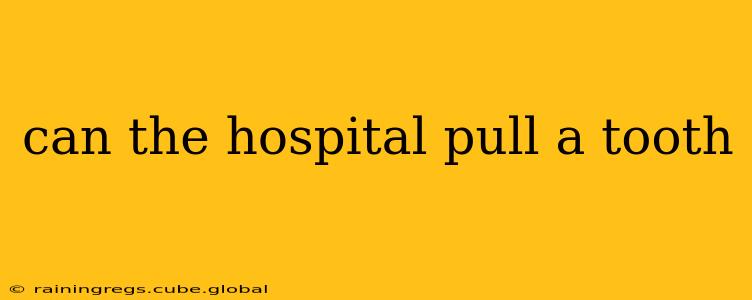Can the Hospital Pull a Tooth? Understanding Emergency Dental Care in Hospitals
While hospitals aren't typically equipped for routine dental procedures like tooth extractions, they absolutely can pull a tooth—but usually only under very specific circumstances. This is because hospitals prioritize emergency and life-threatening situations. Let's explore when a hospital might extract a tooth and what alternatives usually exist.
When Would a Hospital Pull a Tooth?
Hospitals generally only extract teeth in emergency situations where the tooth poses an immediate threat to the patient's health. This could include:
-
Severe Trauma: A significant injury to the mouth, such as a car accident or a blow to the face, might necessitate immediate tooth removal in the hospital's emergency room. This is often done to manage bleeding, prevent infection, or address a life-threatening situation.
-
Infections Spreading to Other Areas: A severe dental infection (abscess) that has spread to the jawbone or bloodstream requires urgent medical attention. The hospital may extract the infected tooth to prevent sepsis, a potentially fatal condition.
-
Obstructed Airway: In extremely rare cases, a severely damaged or loose tooth might be blocking the airway, requiring immediate removal to ensure the patient can breathe.
What About Routine Tooth Extractions?
For routine tooth extractions, such as those needed for wisdom teeth removal or impacted teeth, a dentist or oral surgeon is the appropriate professional. Hospitals generally lack the specialized equipment and trained personnel for these procedures. Attempting a routine extraction in a hospital would be inefficient and potentially put unnecessary strain on emergency resources.
Why Not Just Go to the Dentist or Oral Surgeon?
Visiting a dentist or oral surgeon is always the preferred option for non-emergency dental care, including tooth extractions. They possess:
-
Specialized Training and Equipment: Dentists and oral surgeons have extensive training in dental procedures and access to specialized instruments and techniques for safe and efficient extractions.
-
Sterile Environment: Dental offices maintain a sterile environment that minimizes the risk of infection, crucial for any procedure involving the mouth.
-
Post-Operative Care: They provide detailed instructions and follow-up care for proper healing after the extraction.
What if I Have a Dental Emergency Outside of Hospital Hours?
Many dental practices offer emergency services outside of regular business hours. You should contact your dentist or search online for emergency dental services in your area. Many larger cities have dedicated emergency dental clinics.
Should I Go to the Emergency Room for a Toothache?
Unless your toothache is accompanied by severe swelling, uncontrolled bleeding, or signs of a spreading infection (like fever or difficulty breathing), it's best to contact your dentist first. The emergency room is for life-threatening situations, and misusing ER resources can delay care for patients who truly need it.
What are the signs of a severe dental emergency?
Signs that warrant an immediate trip to the emergency room include:
- Severe bleeding from the mouth that you cannot control.
- Difficulty breathing or swallowing.
- Severe swelling of the face or jaw.
- High fever and chills.
- Spreading infection with visible signs of inflammation.
In summary, while a hospital can pull a tooth in a true medical emergency, it's not the usual place to go for a tooth extraction. Always prioritize seeing a dentist or oral surgeon for non-emergency dental issues. Hospitals are valuable resources best reserved for life-threatening conditions.
